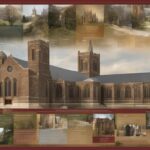The Presbyterian Church in Trinidad and Tobago has a rich and storied history that dates back to 1868 when Canadian missionary John Morton arrived on the island with his family. Morton’s mission was to establish a Christian presence among the East Indian indentured laborers, and in 1876, the first congregation was formed in Princes Town. Initially facing resistance, the Presbyterian Church in Trinidad and Tobago gradually gained momentum and ordained its first group of elders in 1880. Under the leadership of Rev. J.W. McCleod, the church continued to grow, culminating in the dedication of a new church building named St. Andrew’s in 1884.
This section will delve into the origins and founders of the Presbyterian Church in Trinidad and Tobago, key beliefs and doctrines, its historical significance, any denominational splits or schisms that have occurred, the leadership and governance structure, worship practices, contemporary influence, and provide insights into its current world membership number and percentage of world religions.
Key Takeaways:
- The Presbyterian Church in Trinidad and Tobago was founded by Canadian missionary John Morton in 1876.
- The church upholds the Westminster Confession of Faith and shares common beliefs with Presbyterian churches worldwide.
- The Presbyterian Church in Trinidad and Tobago has played a significant role in shaping the religious and social history of the nation.
- There have been no major denominational splits or schisms in the history of the church.
- The church operates under a system of leadership and governance by presbyters or elders.
Origins and Founders
The Presbyterian Church in Trinidad and Tobago was founded in 1876 by Canadian missionary John Morton. Arriving on the island in 1868, Morton had a mission to establish a Christian presence among the East Indian indentured laborers. He first established the mission in Iere Village before expanding to Princes Town, where the first congregation of the Presbyterian Church in Trinidad and Tobago was formed. Morton’s dedication to spreading the Christian faith played a crucial role in laying the foundation of the Presbyterian Church in Trinidad and Tobago.
The Presbyterian Church in Trinidad and Tobago owes its origins to the vision and perseverance of John Morton. His commitment to establishing a religious community among the indentured laborers was met with initial resistance and slow progress. However, through his efforts, the Presbyterian Church steadily grew and continued to make an impact on the Trinidadian society over the years. Morton’s work in establishing the church forms an integral part of its history and legacy.
Today, the Presbyterian Church in Trinidad and Tobago stands as a testament to the dedication and vision of its founders. While Morton is the primary founder, it is also essential to recognize the contributions of other missionaries, pastors, and church members who played significant roles in the early development and growth of the Presbyterian Church in Trinidad and Tobago.
| Key Figures | Role |
|---|---|
| John Morton | Founder, Canadian missionary |
| Rev. J.W. McCleod | Successor to John Morton, continued the work of the mission |
Through the dedication and leadership of these key figures, the Presbyterian Church in Trinidad and Tobago has grown to become one of the prominent Protestant denominations in the nation, impacting the lives of its members and contributing to the religious and social fabric of the country.
Key Beliefs and Doctrines
The Presbyterian Church in Trinidad and Tobago adheres to a set of key beliefs and doctrines that are central to its faith and practice. These beliefs are rooted in the broader Calvinist tradition and are shared by Presbyterian churches worldwide. The church upholds the Westminster Confession of Faith, which serves as its doctrinal standard.
One of the foundational beliefs of the Presbyterian Church is the sovereignty of God. It teaches that God is the ultimate authority and has control over all things. This belief influences the way the church understands God’s providence, grace, and salvation. The church also emphasizes the authority of Scripture, viewing the Bible as the inspired Word of God and the ultimate guide for faith and life.
Salvation by grace through faith is another core belief of the Presbyterian Church. It teaches that salvation is a gift from God and is received through faith in Jesus Christ. The church emphasizes the importance of personal faith and trust in Christ’s finished work on the cross for the forgiveness of sins. Additionally, the Presbyterian Church believes in the priesthood of all believers, affirming that every believer has direct access to God through Christ and can serve as a representative of Christ in the world.
| Key Beliefs and Doctrines of the Presbyterian Church in Trinidad and Tobago |
|---|
| The sovereignty of God |
| The authority of Scripture |
| Salvation by grace through faith |
| The priesthood of all believers |
Presbyterian theology also places a strong emphasis on worship, discipleship, and social justice. The Presbyterian Church in Trinidad and Tobago views worship as a central part of its life and seeks to engage in meaningful and reverent worship practices. Discipleship involves the ongoing process of spiritual formation and growth, as believers seek to live out their faith in their daily lives. Social justice is an integral part of the church’s mission, as it strives to advocate for justice, equality, and compassion in society.
These key beliefs and doctrines shape the identity and mission of the Presbyterian Church in Trinidad and Tobago, guiding its worship, teaching, and engagement with the world.
Historical Significance of the Presbyterian Church in Trinidad and Tobago
The Presbyterian Church in Trinidad and Tobago holds immense historical significance in the religious and social development of the nation. As one of the earliest Protestant denominations on the island, the Presbyterian Church played a pivotal role in shaping the course of Christianity in Trinidad and Tobago.
From its establishment in 1876 by Canadian missionary John Morton, the Presbyterian Church faced initial resistance and slow progress in terms of conversions. However, through the dedicated efforts of Morton and subsequent leaders like Rev. J.W. McCleod, the church steadily grew in influence and impact.
Over the years, the Presbyterian Church in Trinidad and Tobago has been actively involved in community projects, education initiatives, and outreach programs. It has made significant contributions to the welfare of its members and the broader society, addressing the spiritual, social, and educational needs of the local population.
| Impact of the Presbyterian Church in Trinidad | Examples |
|---|---|
| Educational Development | The church established schools and educational institutions, providing access to education for many individuals who would have otherwise been unable to receive it. |
| Social Welfare | The church actively engaged in community service programs, addressing issues such as poverty, healthcare, and social inequality. |
| Empowerment of Marginalized Groups | The Presbyterian Church played a vital role in advocating for the rights and empowerment of marginalized groups, including East Indian indentured laborers and the Afro-Trinidadian community. |
The Presbyterian Church in Trinidad and Tobago has left an indelible mark on the nation’s history. Its commitment to faith, education, and social justice has shaped the lives of countless individuals and contributed to the overall progress and development of Trinidad and Tobago.
Denominational Split or Schisms
The Presbyterian Church in Trinidad and Tobago has had a relatively stable history without any major denominational splits or schisms. While there may have been differences in theological interpretation and practice within the church, these disagreements did not lead to significant divisions. The church has managed to maintain its unity and focus on serving the spiritual needs of its members.
One of the reasons for the Presbyterian Church’s unity is its adherence to the Westminster Confession of Faith, which serves as its doctrinal standard. This common belief system has helped to foster a sense of shared purpose and prevent major fractures within the church. Additionally, the church’s democratic leadership structure, with a General Assembly making decisions and setting policies, allows for open dialogue and the resolution of differences in a peaceful manner.
While there may have been minor disagreements and divisions within the Presbyterian Church in Trinidad and Tobago, these have not resulted in significant schisms that would have led to the formation of separate denominations. The church has remained committed to its mission of spreading the Gospel, ministering to its members, and making a positive impact in the local community.
Historical Overview of the Presbyterian Church
“The Presbyterian Church in Trinidad and Tobago has maintained its unity and focus on serving the spiritual needs of its members throughout its history. While there may have been minor divisions and disagreements, the church has remained committed to its mission and has not experienced any major denominational splits or schisms.”
- Adherence to the Westminster Confession of Faith has helped maintain unity
- Democratic leadership structure promotes open dialogue and peaceful resolution of differences
- Commitment to mission and community impact has prevented major fractures
| Year | Major Events |
|---|---|
| 1876 | Founding of the Presbyterian Church in Trinidad and Tobago by Canadian missionary John Morton |
| 1880 | Ordination of the first group of elders in the Presbyterian Church |
| 1884 | Dedication of the St. Andrew’s church building |
Leadership and Governance
The Presbyterian Church in Trinidad and Tobago operates under a system of leadership and governance that emphasizes the participation of both clergy and laypeople. The church follows a democratic structure, with decisions and policies made collectively by ordained ministers and ruling elders elected by the congregations.
The church is organized into presbyteries, which are regional bodies composed of representatives from local congregations. These presbyteries serve as forums for discussion, decision-making, and coordination of ministry efforts. They provide a platform for collaboration and accountability among the various churches within the denomination.
The highest governing body of the Presbyterian Church in Trinidad and Tobago is the General Assembly. Comprising representatives from presbyteries, the General Assembly meets annually to deliberate on matters of doctrine, worship, mission, and administration. It sets policies, elects moderators, and provides guidance for the denomination as a whole.

Through this system of leadership and governance, the Presbyterian Church in Trinidad and Tobago ensures that decisions are made in a manner that reflects the will of the entire denomination. It promotes transparency, accountability, and the involvement of all members in shaping the direction and priorities of the church.
Worship Practices of the Presbyterian Church in Trinidad and Tobago
The worship practices of the Presbyterian Church in Trinidad and Tobago are deeply rooted in tradition and reverence. The church values a structured approach to worship, incorporating a variety of elements to engage its congregation in a meaningful way. Central to Presbyterian worship are prayers, hymns, scripture readings, and sermons, which collectively foster spiritual reflection and growth. The sacraments of baptism and the Lord’s Supper hold a significant place in Presbyterian worship, symbolizing the grace and presence of God in the lives of believers.
Presbyterian worship services often follow a liturgical format, which emphasizes the corporate nature of worship and the participation of the congregation. This structured approach allows for a sense of unity, as members come together to worship and praise God. Through dynamic preaching and teaching, the church seeks to inspire and equip its members for a life of faith and service.
Furthermore, the Presbyterian Church in Trinidad and Tobago places importance on the priesthood of all believers, encouraging active participation from the congregation. This involvement extends beyond the worship service itself and encompasses various ministries and outreach programs. By engaging in worship and living out their faith, members of the Presbyterian Church actively contribute to the spiritual growth and collective impact of the church in Trinidad and Tobago.
Table: Elements of Worship
| Element | Description |
|---|---|
| Prayers | A time for communal and individual prayers, expressing praise, confession, and intercession. |
| Hymns | Singing of traditional hymns and contemporary worship songs to offer praise and worship to God. |
| Scripture Readings | Sharing and reflection upon passages from the Bible to guide and enlighten the congregation. |
| Sermons | Preaching and teaching of God’s Word, offering spiritual guidance and insight. |
| Baptism | Symbolic act of initiation into the church, representing spiritual rebirth in Christ. |
| Lord’s Supper | Communion, where believers partake in bread and wine, symbolizing the body and blood of Jesus Christ. |
Overall, the worship practices of the Presbyterian Church in Trinidad and Tobago provide a meaningful and enriching experience for its members. Through structured worship services, the church encourages spiritual growth, fosters a sense of unity, and equips believers to live out their faith in service to God and others.
Contemporary Influence of the Presbyterian Church in Trinidad and Tobago
The Presbyterian Church in Trinidad and Tobago continues to have a significant influence on the religious and social landscape of the nation. With its strong belief in the sovereignty of God and the authority of Scripture, the church plays a vital role in shaping the spiritual lives of its members and the wider community.
One of the key areas where the Presbyterian Church in Trinidad and Tobago has made an impact is through its commitment to social justice and community service. The church actively engages in various outreach programs, addressing issues such as poverty, education, and healthcare. By advocating for the marginalized and disadvantaged, the church demonstrates its dedication to living out its faith in practical ways.
“The church’s teachings on social justice and equality have resonated with many individuals and groups in Trinidad and Tobago, leading to positive change in communities across the nation.” – Rev. Elizabeth Johnson, Presbyterian Minister
Furthermore, the Presbyterian Church in Trinidad and Tobago has played a significant role in promoting education. The church has established numerous schools and educational institutions, providing quality education to children and young adults. By emphasizing the value of education, the church contributes to the overall development and empowerment of individuals within Trinidadian society.
The Presbyterian Church in Trinidad and Tobago Today
Today, the Presbyterian Church in Trinidad and Tobago remains one of the largest Protestant denominations in the country. Its influence extends beyond the walls of its congregations, as it actively participates in interfaith dialogues and collaborations with other religious organizations. The church is committed to fostering unity and understanding among different faith communities, promoting a culture of harmony and respect.
In conclusion, the contemporary influence of the Presbyterian Church in Trinidad and Tobago is evident through its commitment to social justice, community service, education, and interfaith collaboration. As the church continues to uphold its core beliefs and values, it plays a vital role in shaping the spiritual, social, and educational fabric of the nation.
Current World Membership and Percentage of World Religions
The current world membership number of the Presbyterian Church in Trinidad and Tobago is not available. However, the Presbyterian Church is a part of the larger global Presbyterian family, which has millions of members worldwide. As one of the major Protestant denominations, Presbyterianism has a significant presence in countries such as Scotland, the United States, South Korea, and various African nations.
| World Religions | Percentage |
|---|---|
| Christianity | 31.11% |
| Islam | 24.9% |
| Hinduism | 15.16% |
| Buddhism | 6.79% |
| Judaism | 0.2% |
| Other Religions | 22.84% |
Note: The percentages above reflect the distribution of world religions in general and do not specifically represent the Presbyterian Church. The exact percentage of Presbyterians within the broader Christian population is not provided here. The Presbyterian Church contributes to the overall percentage of Christianity.
The Presbyterian Church’s demographics vary across different regions and countries. For example, in Scotland, where Presbyterianism originated, it remains one of the largest Protestant denominations, with a significant percentage of the population identifying as Presbyterians. In the United States, the Presbyterian Church (USA) has a substantial membership and presence, particularly in regions such as the Northeast and Midwest. In countries like South Korea and various African nations, Presbyterianism has also gained prominence and has a significant number of followers.
Conclusion
The history of the Presbyterian Church in Trinidad and Tobago is a testament to the dedication and perseverance of its founders and members. Founded by Canadian missionary John Morton in 1876, the church has grown from humble beginnings to become one of the largest Protestant denominations in the nation.
With its strong emphasis on the sovereignty of God, the authority of Scripture, and the priesthood of all believers, the Presbyterian Church in Trinidad and Tobago has upheld key beliefs and doctrines that have shaped the lives of its members and the communities they serve.
Throughout its history, the church has made a significant impact on the religious and social landscape of Trinidad and Tobago. From its involvement in community projects and education initiatives to its commitment to social justice and outreach programs, the Presbyterian Church has demonstrated a deep dedication to serving the needs of its members and society at large.
As a denomination, the church has maintained its unity and focus on spiritual growth, avoiding major denominational splits or schisms. Its democratic structure of leadership and governance, which includes ordained ministers and ruling elders, ensures a collective decision-making process that represents the diverse perspectives of its members.
Today, the Presbyterian Church in Trinidad and Tobago continues to be a prominent presence, both within the nation and globally. With its reverent worship practices, mission work, and commitment to social justice, the church remains relevant and influential, contributing to the vibrant religious fabric of Trinidad and Tobago and the wider Presbyterian family worldwide.
FAQ
What is the history of the Presbyterian Church in Trinidad and Tobago?
The Presbyterian Church in Trinidad and Tobago was founded by Canadian missionary John Morton in 1876. He arrived on the island in 1868 and established the mission among the East Indian indentured laborers. The first congregation was formed in Princes Town in 1876, and the church has since played a significant role in shaping the religious and social landscape of the nation.
What are the key beliefs and doctrines of the Presbyterian Church in Trinidad and Tobago?
The Presbyterian Church in Trinidad and Tobago upholds the Westminster Confession of Faith as its doctrinal standard. It emphasizes the sovereignty of God, the authority of Scripture, salvation by grace through faith, and the priesthood of all believers. The church also places importance on worship, discipleship, and social justice.
Has the Presbyterian Church in Trinidad and Tobago experienced any major denominational splits or schisms?
The Presbyterian Church in Trinidad and Tobago has not experienced any major denominational splits or schisms. However, there may have been minor disagreements or divisions within the church based on differences in theological interpretation and practice.
How is the Presbyterian Church in Trinidad and Tobago governed?
The Presbyterian Church in Trinidad and Tobago operates under a system of leadership and governance by presbyters or elders. The church is organized into presbyteries, which are composed of ordained ministers and ruling elders elected by the congregations. The highest governing body is the General Assembly, which sets policies and makes decisions for the denomination.
What are the worship practices of the Presbyterian Church in Trinidad and Tobago?
Worship in the Presbyterian Church in Trinidad and Tobago is characterized by a reverent and structured approach. It includes elements such as prayers, hymns, scripture readings, and sermons. The church values the sacraments of baptism and the Lord’s Supper, which are central to its worship services. Presbyterian worship often follows a liturgical format and emphasizes the participation of the congregation.
What is the contemporary influence of the Presbyterian Church in Trinidad and Tobago?
The Presbyterian Church in Trinidad and Tobago remains one of the largest Protestant denominations in the country and has a significant influence on the religious and social landscape. The church actively engages in mission work, education initiatives, and social outreach, demonstrating a commitment to social justice and community service.
What is the current world membership number and percentage of world religions for the Presbyterian Church in Trinidad and Tobago?
The exact current world membership number of the Presbyterian Church in Trinidad and Tobago is not available. However, Presbyterianism is one of the major Protestant denominations globally and has a significant presence in countries such as Scotland, the United States, South Korea, and various African nations.
















